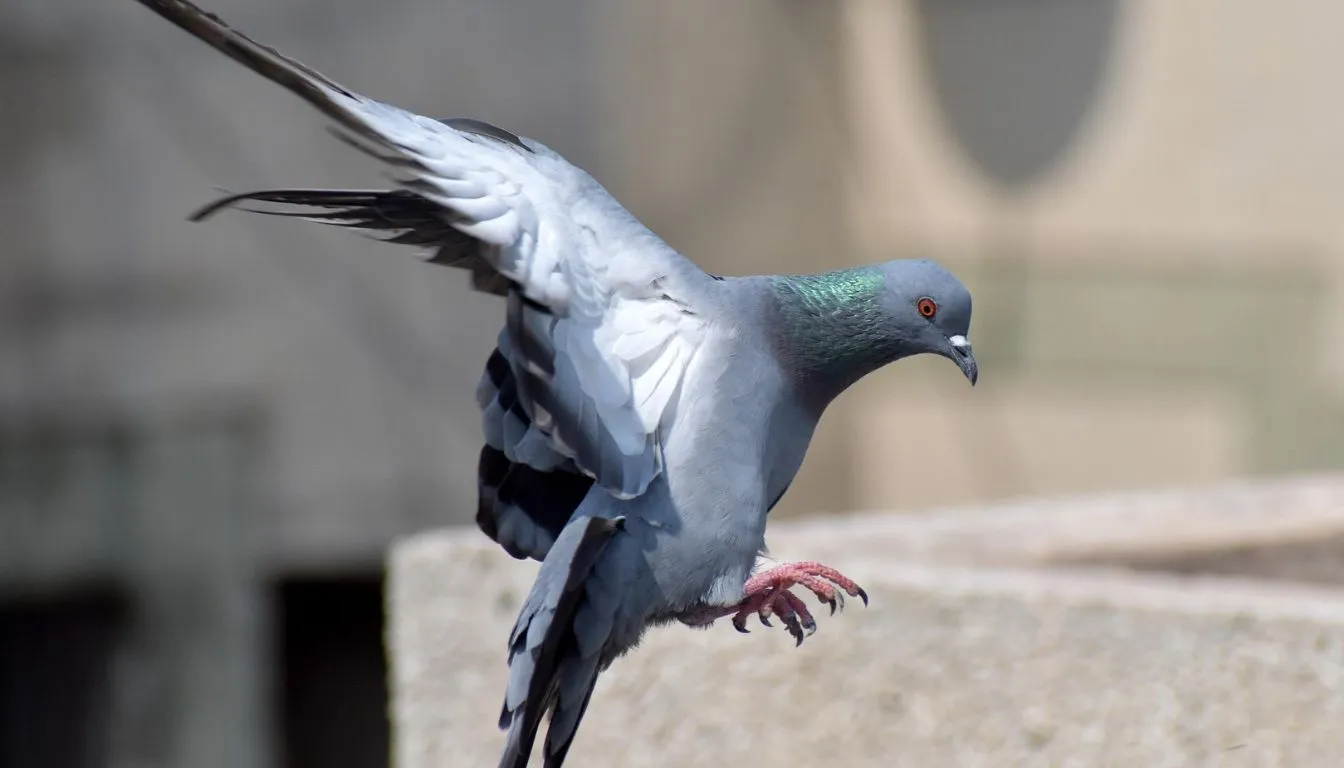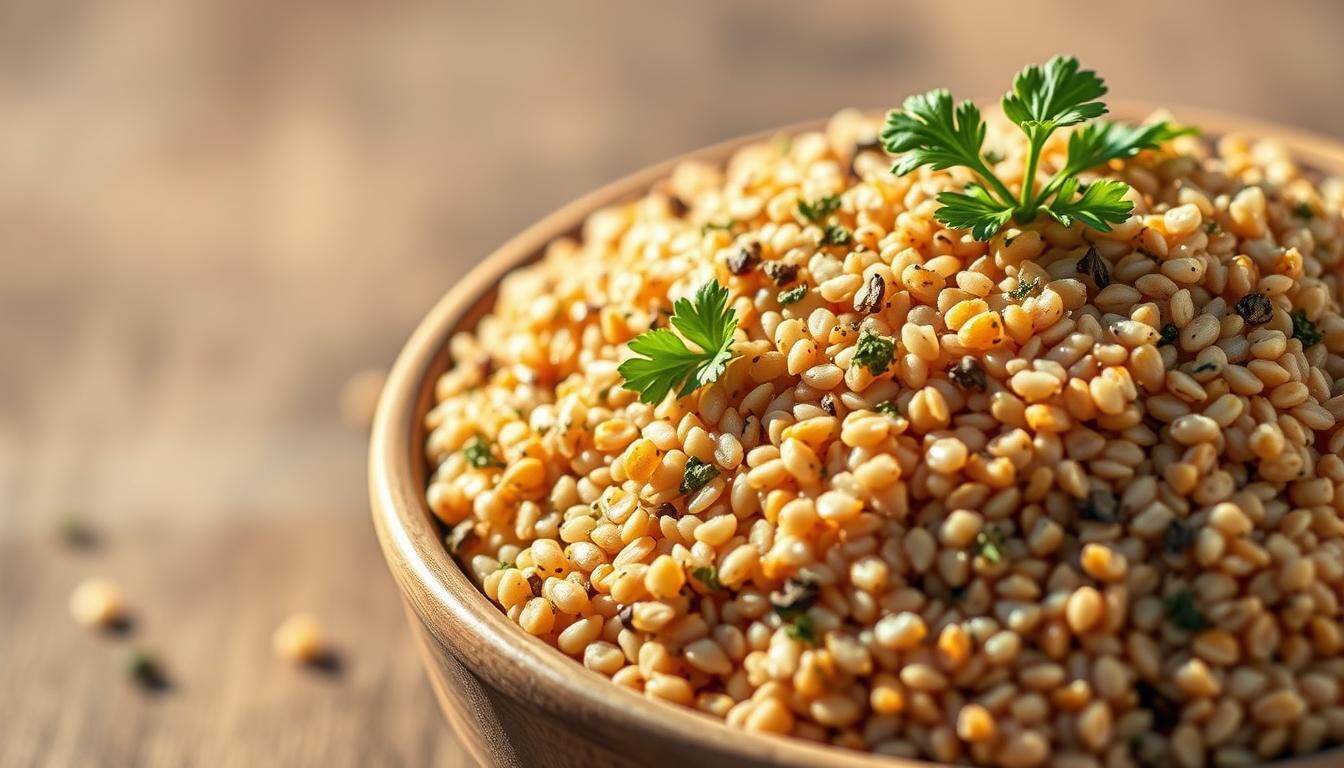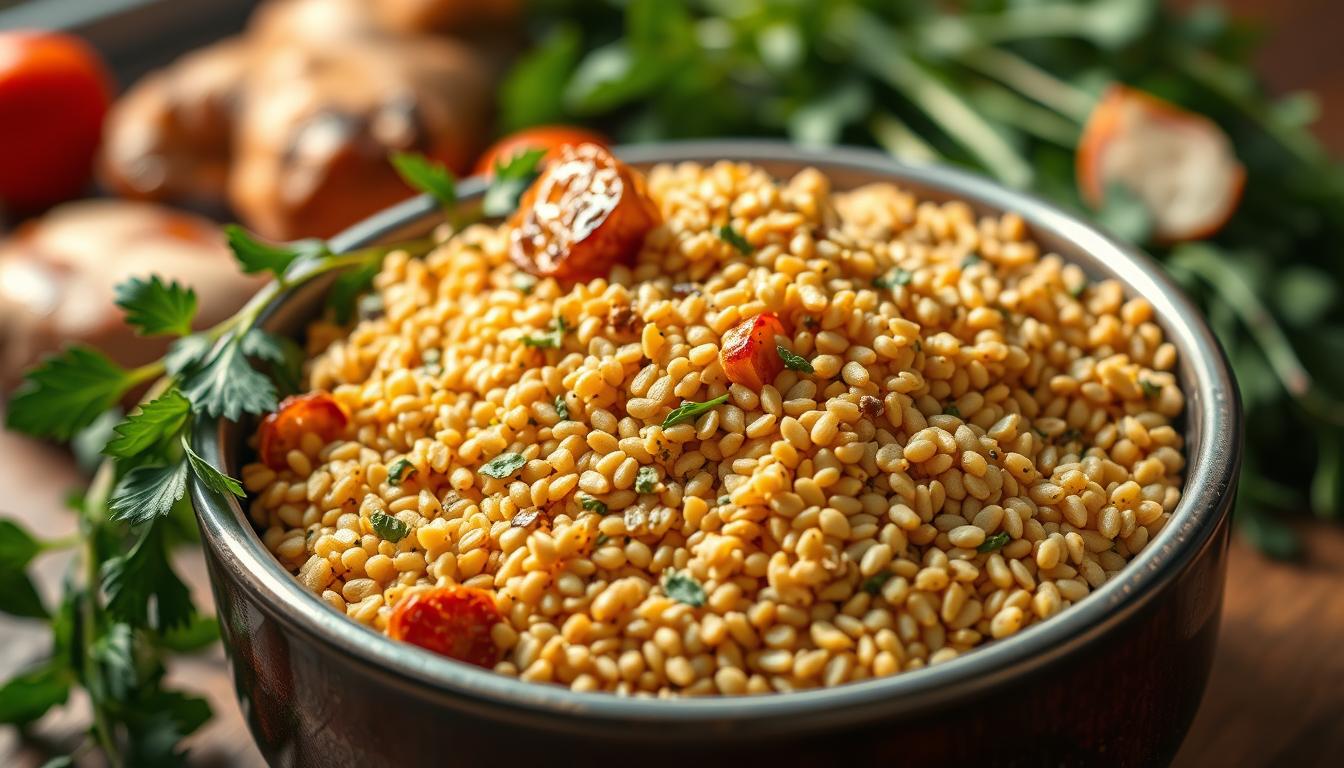Have you ever watched a city pigeon and wondered about its life story? These birds are everywhere in cities and have a fascinating survival journey. Their ability to adapt to different environments greatly affects their lifespan.
Pigeons live in both busy cities and quiet suburbs. Their longevity depends on many factors like environment, health, and genetics. This shows a complex world that’s not always seen by casual observers.
Research shows pigeons live 5 to 15 years. But, their lifespan can change a lot based on several important factors. Some pigeons thrive, while others face big challenges.
Table of Contents
Key Takeaways
- Pigeons have survived for over 5,000 years of domestication
- Urban environments significantly impact pigeon longevity
- Health management can improve survival rates
- Genetic factors play a crucial role in pigeon life span
- Environmental challenges directly affect pigeon survival
Understanding the Fascinating World of Pigeons
Pigeons are amazing creatures that have been important to humans for a long time. There are about 400 million pigeons around the world. They live in many places, making them very successful in cities. They can live from 6 to 15 years, depending on where they live.
Pigeons have a special place in human history. They helped send messages in ancient times and during wars. In World War I, about 60,000 pigeons were used, showing how smart and useful they are.
Historical Significance of Pigeons
Early settlers brought pigeons to America for food and to send messages. These birds have adapted well, living longer than many others. They have skills like:
- Exceptional navigation skills
- Ability to see ultraviolet light
- Efficient respiratory systems with nine air sacs
Different Types of Pigeons in Modern World
Pigeons come in many shapes and sizes. The Crowned Pigeon of New Guinea is very big, over 2.5 kg. Domestic pigeons can live up to 15 years. Wild ones usually live 6 to 10 years.
Role of Pigeons in Urban Ecosystems
In cities like New York, pigeons are everywhere, over 1 million. They help keep the city balanced. Their ability to adapt affects how long they live and survive.
Key Factors Affecting Pigeon Life Span
Knowing what affects a pigeon’s aging is key to keeping them healthy for a long time. These birds can live up to 15 years in the wild. Domesticated pigeons might live over 20 years if they have the best care.
Several important things affect how long a pigeon lives:
- Genetic predispositions
- Nutritional intake
- Environmental conditions
- Health management
- Stress levels
What a pigeon eats is very important for their health and how long they live. A good diet helps their immune system and keeps them healthy. Studies show that pigeons need certain nutrients to stay healthy and avoid age-related problems.
“A well-nourished pigeon is a healthy pigeon” – Avian Health Experts
The environment also plays a big role in how long a pigeon lives. Cities can be tough for pigeons because of pollution, less food, and more diseases. But, the countryside is often better for them.
How you take care of a pigeon’s health can make a big difference. Regular vet visits, the right food, and less stress are important. These steps help pigeons live longer and healthier lives.
By learning about these factors, you can help your pigeon friends live longer and happier lives.
Natural Habitat and Its Impact on Longevity
The survival and lifespan of feral pigeons depend a lot on their environment. These birds can live in many places, from busy cities to quiet countryside. Their ability to adapt shows how their habitat affects their life span.
Urban vs Rural Environment Effects
Urban areas are better for pigeons. City pigeons get:
- Food from people all the time
- Safe places to nest like building ledges
- Less danger from predators
Rural pigeons have it tougher. They face:
- Less food around
- More danger from predators
- Harsher weather
Climate and Weather Considerations
Weather is key for pigeon survival. Extreme weather can shorten their lives. Pigeons in mild climates usually live longer because of:
- Mild temperatures
- Regular rain
- Plenty of plants
Nesting Conditions and Survival Rates
Good nesting spots are vital for pigeon survival. Protected nesting sites with little disturbance help more pigeons live. In captivity, pigeons can live up to 20 years, while in the wild, they might only live 3-5 years. This shows how important a good habitat is.
Adaptability is the key to survival for urban pigeons.
Nutritional Requirements for Optimal Health
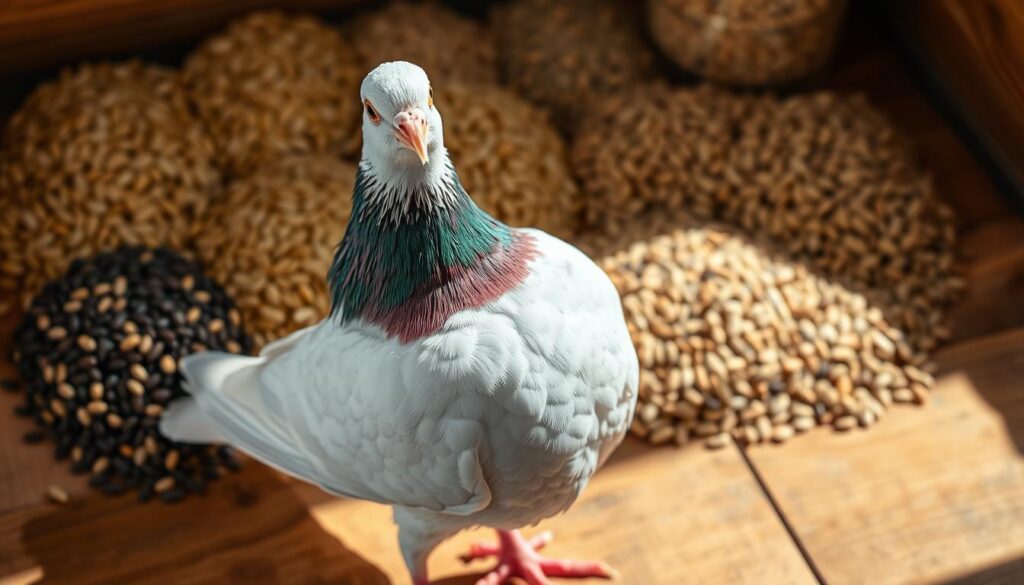
Starting with a good diet is key to your pigeon’s health and long life. Pigeons need a special diet that meets their unique needs and energy needs.
Racing pigeons need a diet with five important nutrients for top performance and health. These nutrients are:
- Proteins for muscle growth
- Fats for energy and stamina
- Vitamins for immune support
- Minerals for strong bones
- Carbohydrates for daily energy
Proteins are very important for pigeon health. Recommended protein-rich foods include pigeon peas, vetch, lentils, corn, and wheat. These foods help with tissue repair and are crucial during breeding and molting.
Fats are also key. Sunflower seeds, flaxseeds, and hemp seeds give essential fatty acids for energy. Adding oily seeds and supplements like flaxseed oil can help during hard training.
A well-rounded diet tailored to specific life stages is essential for optimal pigeon health and performance.
Vitamins and minerals are vital for pigeon nutrition. Vitamins A, D, E, and B-complex help with immune and metabolic functions. Minerals like calcium, phosphorus, and zinc are important for strong bones and muscles.
How often you feed your pigeon is also important. Most experts suggest two meals a day – one in the morning and one in the evening. This keeps energy levels steady. Make sure your pigeon always has fresh, clean water, especially when it’s hot or they’re training hard.
Common Health Challenges and Diseases
Pigeons face many health challenges that affect their aging and longevity. It’s important to know these health risks to keep pigeons healthy and prevent diseases.
Respiratory infections are a big threat to pigeons. Being around pigeon droppings can cause serious respiratory problems. These problems weaken their immune system and shorten their lives.
Respiratory Infections and Prevention
The main respiratory challenges for pigeons are:
- Cryptococcosis – causing pneumonia-like symptoms
- Histoplasmosis – potentially leading to lung complications
- Hypersensitivity pneumonitis – triggered by prolonged exposure to droppings
To prevent these risks, it’s key to take protective measures. Wearing protective gear and keeping living areas clean can greatly reduce infection chances.
Parasitic Infections and Treatment
Parasitic infections can seriously harm pigeon health and longevity. Common parasites include:
- External mites
- Internal worms
- Fungal infections
Regular vet visits and targeted treatments can effectively manage these parasites.
Genetic Health Predispositions
Genetics are very important for pigeon health and longevity. Some pigeons may be more prone to diseases because of their genes. Knowing these predispositions helps in creating better health plans.
Prevention is always better than cure when it comes to maintaining optimal pigeon health and extending their lifespan.
The Role of Genetics in Pigeon Life Span
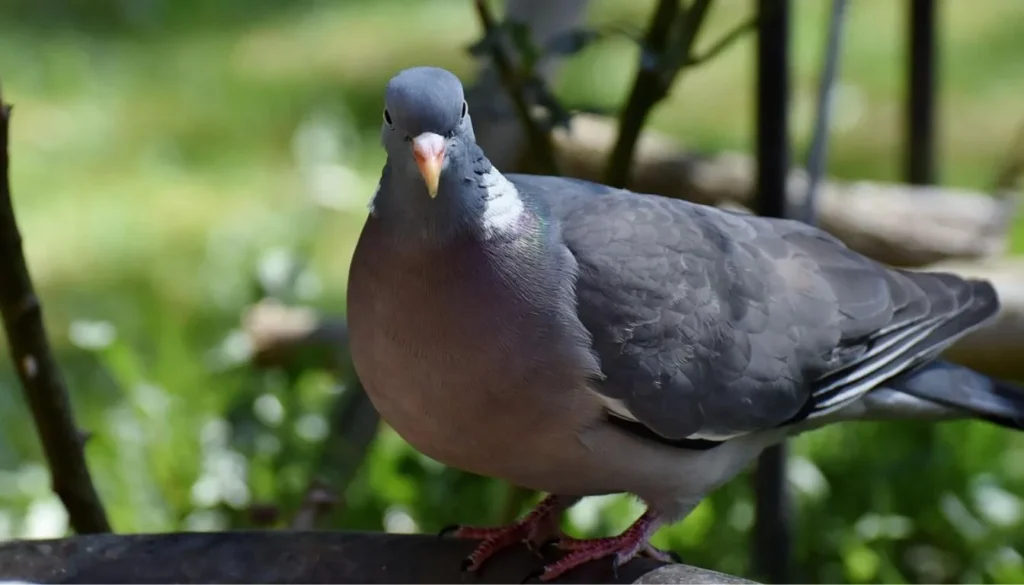
Genetics are key in figuring out how long pigeons live and their health. By studying their genes, we learn a lot about their long life and good health.
Researchers have found important genes that affect how long pigeons live:
- Specific gene mutations affecting disease resistance
- Inherited traits related to metabolic efficiency
- Genetic predispositions to certain health conditions
Over time, selective breeding has changed pigeon genetics a lot. Different breeds have unique genes that affect their lifespan. For example, some genes help pigeons fight off diseases better.
Genetic testing has become a powerful tool in understanding pigeon health and potential longevity.
Today, scientists are looking for specific genes that help pigeons stay healthy and live longer. They’re interested in genes that help with metabolism, immune system, and cell growth.
We can expect more research to give us even more info on pigeon aging. This could lead to ways to help pigeons live longer and healthier lives.
Environmental Threats and Survival Challenges
Urban environments are tough for pigeons. They face dangers that can shorten their lives. Feral pigeons live in a world filled with risks.
City pigeons deal with many dangers every day. These challenges can cut their life span from 10-15 years to 3-5 years. It’s a harsh city life.
Urban Hazards and Pollution
Urban environments pose big health risks to pigeons:
- Air pollution from vehicle emissions
- Chemical contaminants in food sources
- Toxic materials in building structures
- Electromagnetic radiation from urban infrastructure
“Urban survival is a daily battle for feral pigeons, where every moment tests their adaptability and resilience.” – Wildlife Urban Research Team
Predator Risks and Defense Mechanisms
Pigeons have clever ways to fight off predators. They are quick and alert. This helps them avoid threats from:
- Hawks and falcons
- Domestic cats
- Raccoons
- Human-related dangers
Despite these dangers, pigeons can still live well in cities. Their ability to survive shows their strong evolutionary spirit.
Human Interaction and Its Effects
Humans greatly affect the lifespan of domestic pigeons through various interactions. From ancient times to today’s cities, pigeons have a complex bond with humans. This bond impacts their survival and how long they live.
Pigeons have been domesticated for about 10,000 years. They’ve learned to thrive in human environments. In cities, nearly 80 pigeons can be seen at any time.
- Selective breeding influences domestic pigeon lifespan
- Urban structures provide unique nesting opportunities
- Human care can extend or shorten pigeon life expectancy
Positive interactions with humans can help pigeons. Good food, vet care, and safety from predators can make them live longer. Pigeon rehabilitators like Paul Themis show how humans can help these birds.
The perception of pigeons has evolved from revered messengers to often misunderstood urban inhabitants.
On the other hand, negative actions by humans can harm pigeons a lot. Pollution, destroyed habitats, and being hunted can lower their numbers. Feeding bans, like in Trafalgar Square in 2007, have caused pigeons to starve.
It’s important to understand the complex relationship between humans and pigeons. This knowledge helps in their conservation and survival in today’s cities.
Breeding and Reproduction Impact
Pigeons have amazing reproductive abilities that affect their lifespan. Their breeding patterns show how reproduction impacts their life span.
Domestic pigeons can lay up to 12 eggs a year until they are about 6 years old. They have unique mating habits, including:
- Female pigeons can start breeding at just 7 months
- They usually lay 1-2 eggs at a time
- Eggs hatch in about 18 days
- Chicks leave the nest after 25-32 days
Mating Patterns and Energy Demands
Breeding is very energy-intensive for pigeons, which can affect their aging. Each breeding cycle uses a lot of energy, which might shorten their lives. Urban pigeons breed more often than those in rural areas.
Offspring Care and Survival Strategies
Good care of offspring is key to keeping the population stable. Adult pigeons teach young ones important survival skills. This includes how to find food and navigate.
Reproductive success is a delicate balance between energy expenditure and genetic continuation.
Learning about pigeon breeding helps us see how it affects their life span and population.
Conservation Efforts and Population Management
Keeping rock pigeon populations healthy needs a detailed plan. Cities face special challenges in caring for pigeons. Learning about these efforts helps us create better environments.
Cities in the U.S. are finding new ways to handle pigeon numbers. They focus on a few main areas:
- Habitat changes to cut down nesting spots
- Kind ways to control pigeon numbers
- Teaching people about managing urban wildlife
- Keeping ecosystems in balance
Changes in the environment can affect how long pigeons live. Good management plans aim to:
- Lower health risks from big pigeon groups
- Protect native birds from competition
- Lessen damage from pigeon droppings
- Keep urban areas diverse
Sustainable population control means knowing pigeon behavior and using gentle methods. Feeds that prevent breeding, keeping pigeons out, and smart city design help manage numbers. This way, we avoid harming them.
Responsible wildlife management sees pigeons as key parts of city life, not just pests.
By choosing humane conservation, cities can find a balance. This balance supports both pigeon health and the environment.
Comparative Analysis of Wild vs Domestic Pigeon Life Span
Looking into the life span of pigeons shows interesting differences between wild and domestic ones. Domestic pigeons live longer because they get regular food, vet care, and safety from predators. In contrast, feral pigeons in cities might live 3-5 years, while domestic ones can reach 15-20 years with good care.
Domestic pigeons live longer thanks to careful breeding, health checks, and safe homes. Racing pigeons and special breeds get even better care, which can add years to their lives. Wild pigeons, however, face many dangers like predators, bad weather, and diseases. These challenges cut down their chances of survival.
Studies show that feral pigeons in cities adapt well, breeding all year and becoming more resilient. They find food near people and get used to tough conditions. By studying both wild and domestic pigeons, scientists learn how care, food, and environment affect their lives.
This knowledge helps bird lovers, wildlife experts, and pigeon keepers care for pigeons better. Whether you’re raising pigeons at home or studying city wildlife, knowing what affects their survival is key. It leads to better ways to protect and care for pigeons.
FAQ
What is the average life span of a typical pigeon?
Wild pigeons usually live 3-5 years. Domestic pigeons can live up to 15-20 years with good care. Their life span depends on their environment, diet, and health.
Do wild and domestic pigeons have different life expectancies?
Yes, they do. Domestic pigeons live longer than wild ones. They get better food, are safer, and get vet care, which helps them live longer.
What are the main factors that affect pigeon life span?
Many things affect how long a pigeon lives. Diet, environment, genes, health care, and dangers in cities are key. Each one plays a big role in a pigeon’s life span.
How does diet impact pigeon longevity?
A good diet is very important for pigeons. They need a mix of seeds, grains, and supplements. Bad diet can weaken them and shorten their lives. Keeping them hydrated and varied in diet is crucial.
What health challenges commonly affect pigeons?
Pigeons face many health problems. They can get sick with infections, parasites, and genetic issues. Regular vet visits and care can help prevent these problems.
How do urban environments impact pigeon life span?
Cities are hard for pigeons. They face pollution, dangers from cars, less food, and predators. These make their lives shorter than in the countryside or homes.
Can pigeons live longer in captivity?
Yes, pigeons in homes or controlled settings live longer. They get better food, are safer, and get vet care. This can add years to their life.
How do breeding and reproduction affect pigeon longevity?
Breeding is hard work for pigeons. It can stress them and shorten their lives. Poor conditions and too much breeding can harm their health and life span.
What role do genetics play in pigeon life span?
Genetics are very important for pigeons. They affect health, disease resistance, and how long they live. Breeding for better health can make pigeons live longer.
Are there conservation efforts to protect pigeon populations?
Yes, there are efforts to save pigeon populations. This includes managing their genes, protecting their homes, and understanding their numbers. It helps keep pigeons healthy and alive in different places.
Source Links
- From Billions to None: The Swooping Downfall of the Passenger Pigeon – https://thesciencesurvey.com/spotlight/2025/03/09/from-billions-to-none-the-swooping-downfall-of-the-passenger-pigeon/
- Health Management Programs for all Stages of the Pigeon Year – https://www.auspigeonco.com.au/health-management-programs-for-all-stages-of-the-pigeon-year.html
- Fascinating Pigeon Facts and Figures: 2024 Insights – https://www.ovocontrol.com/pigeon-facts-figures?srsltid=AfmBOorzpYM12J2dS8Vyar0WF1JX8Hoz1W1q03tKSuEFrdqdVkrRBNrK
- Understanding and Protecting Pigeons and Knowing Their History – https://animalcharityevaluators.org/blog/understanding-protecting-pigeons/
- What you never knew about pigeons – https://www.cbsnews.com/news/what-you-never-knew-about-pigeons/
- Pigeon | Bird of Prey, Flight & Migration Patterns | Britannica – https://www.britannica.com/animal/pigeon
- Feral pigeon – https://en.wikipedia.org/wiki/Feral_pigeon
- How Long Do Pigeons Live in the Wild vs. Captivity? – Pigeon Life Cycle – https://www.animalwised.com/how-long-do-pigeons-live-lifespan-of-a-pigeon-4910.html
- How Long Do Pigeons Live? Discover Their Lifespan – Comfi Shark – https://www.comfishark.com/how-long-do-pigeons-live-discover-their-lifespan/
- Nutritional Requirements for Racing Pigeons – https://starmilling.com/top-nutritional-requirements-racing-pigeons/
- Fascinating Pigeon Facts and Figures: 2024 Insights – https://www.ovocontrol.com/pigeon-facts-figures?srsltid=AfmBOooyuymy0ZZzRWuSJt91OR_eF2UW9zcY-HVewvizmp_aR8rurKcJ
- No title found – https://www.apexbirdcontrol.uk/article/do-pigeons-carry-diseases
- Pigeon menace: A health hazard thriving in plain sight – https://www.indiatoday.in/health/story/pigeons-menace-dropping-feathers-health-hazard-lung-diseases-2606803-2024-09-26
- Genomic insights into pigeon breeding: GWAS for economic traits and the development of a high-throughput liquid phase array chip – https://pmc.ncbi.nlm.nih.gov/articles/PMC11851283/
- DNA tests for dogs, cats and other animals – AnimaLabs© – https://www.animalabs.com/genetics-of-racing-pigeons/
- Hereditary Divergence in Pigeons – https://www.mathewsopenaccess.com/scholarly-articles/hereditary-divergence-in-pigeons.pdf
- Unveiling the Lifespan of Pet Pigeons: A Comprehensive Guide – https://dtermination.com/how-long-do-pet-pigeons-live/
- How Pigeons Survive the Winter – https://animalcontrol.nyc/how-pigeons-survive-the-winter/
- How humans betrayed pigeons – https://wired.me/culture/how-humans-betrayed-pigeons/
- Why do people persecute city pigeons? – https://www.bbc.com/future/article/20240620-why-do-people-persecute-city-pigeons
- The Human Relationship with Pigeons: Forgotten War Heroes – https://www.nal.usda.gov/collections/stories/human-relationship-pigeons-forgotten-war-heroes
- Fascinating Pigeon Facts and Figures: 2024 Insights – https://www.ovocontrol.com/pigeon-facts-figures?srsltid=AfmBOooqoAnZcQBJ1eiiDSstRr-mfeQc9cyWpX0Plp2HT2X8-wIRnOLA
- Ethogram of the Pigeon – Great Lakes Pigeon Rescue – https://greatlakespigeonrescue.org/ethogram-of-the-pigeon/
- Carcass, Egg Characteristics and Leg Bone Dimensions of Pigeons of Different Origin – https://pmc.ncbi.nlm.nih.gov/articles/PMC11117358/
- Managing Risks of Pigeons in Urban Areas | Green City Times – https://www.greencitytimes.com/managing-risks-of-pigeons-in-urban-areas/
- Environmental Issues Caused by Large Pigeon Flocks | How to Manage Them | Focusing on Wildlife – https://focusingonwildlife.com/news/environmental-issues-caused-by-large-pigeon-flocks-how-to-manage-them/
- Molecular characteristics and phylogenetic analysis of pigeon paramyxovirus type 1 isolates from pigeon meat farms in Shanghai (2009–2012) – https://pmc.ncbi.nlm.nih.gov/articles/PMC11087573/
- Frontiers | Hematologic and clinical chemistry reference intervals for six species of wild birds frequently rescued in the Republic of Korea – https://www.frontiersin.org/journals/veterinary-science/articles/10.3389/fvets.2024.1484082/full
- The Dual Role of Domestic Pigeons in Australia – https://aussieanimals.com/introduced-species/domestic-pigeon/

